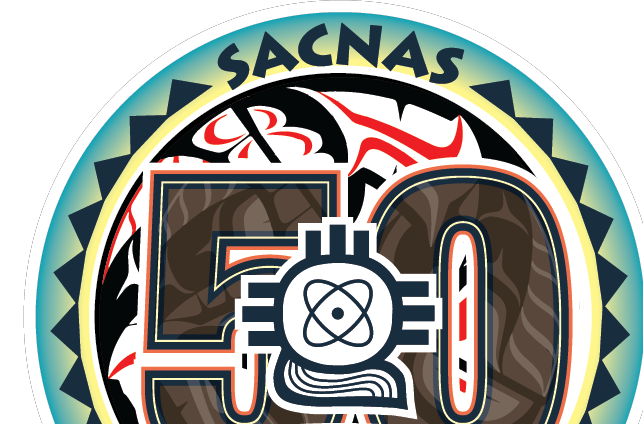
The 50th anniversary of the National Diversity in STEM Conference by the Society for the Advancement of Chicanos/Hispanics and Native Americans in Science is now open for registration.
The conference will be held October 26-28 in Portland, Oregon, and SACNAS aims to pay tribute to the Native American tribes in the Pacific Northwest by using a new logo.
The logo incorporates elements of Pacific Northwest Native American art and the colors of SACNAS to honor and celebrate the 50th anniversary of the organization. The background features the salmon and raven, which hold significance to the Indigenous people of the Pacific Northwest.
The logo was designed in collaboration between SACNAS and Rusty Gillette, a graphic artist who is a member of the Arikara and Hidatsa tribes from the Fort Berthold Reservation in North Dakota.
SACNAS’ story began in the 1970s, a decade that saw increased focus on cultural and societal issues. SACNAS was founded in 1973 when a few Native American and Chicano scientists were in an elevator at the American Association for the Advancement of Science (AAAS) meeting.
At the time, advanced science degrees were rare in Hispanic and Native American communities. The first official annual meeting of SACNAS was held in Atlantic City, New Jersey in 1973, with about 50 members in attendance. Today, SACNAS has over 9,000 multicultural and multidisciplinary members.
SACNAS is the largest multicultural organization promoting diversity in STEM fields. They welcome anyone to join them in their 50th year, as they celebrate their inclusive national network’s transformational impact.
SACNAS believes that underrepresented groups should be given opportunities to bring unique perspectives to the scientific community. Mentoring programs for aspiring scientists of color are necessary to promote diversity and inclusivity.
SACNAS hosts an annual conference that covers various topics, including the effects of climate change on indigenous peoples, community-engaged research, and citizen science. The organization has grown significantly, with approximately 9,000 attendees at last year’s conference in Puerto Rico, including many of the 6,000 members on SACNAS’ roster.
“Holding and sharing our past and STEM futures” 🙌💐
Meet the incredibly talented artist behind the #2023NDiSTEM artwork: Robin Aguilar (they/them), PhD Candidate University of Washington, Department of Genome Sciences.
Read more here! >>> https://t.co/HEBgjDrHs2 pic.twitter.com/Jv3tmtd38m
— SACNAS (@SACNAS) June 12, 2023
Richard Tapia, the director of Rice University’s Tapia Center for Excellence and Equity, regrets that more Research 1 institutions, such as Harvard, Princeton, Rice, and Stanford, are less involved in SACNAS. In his upcoming book, “Losing the Precious Few: How America Fails to Educate Its Minorities in Science and Engineering,” Tapia stresses the need for diversity in STEM education across all universities.
Dr. LeManuel “Lee” Bitsóí, Brandeis University’s vice president for diversity, equity, and inclusion, is concerned about how the ruling on affirmative could impact SACNAS’ mission and initiatives and the potential loss of financial aid and scholarships based on race and ethnicity. He wonders if future legislation could prevent SACNAS from having a voice or thwart its efforts. If such programs were derailed, it would be a setback for SACNAS and similar organizations.
Geneticist Lambert notes changes in the perception of systemic barriers for Indigenous and Hispanic scientists. These barriers exist regardless of whether their families have been in the U.S. for a long time or if they are recent immigrants.
Dr. José Vargas-Muñiz, a molecular geneticist and microbiologist at Southern Illinois University, shares his experience at the SACNAS conference in 2010. He recalls receiving warnings that he was “too loud,” but the conference confirmed that these warnings were misguided.
The conference celebrated Hispanic music, an Indigenous blessing, and keynote speakers welcoming everyone in Spanish. This interweaving of cultural identity with science was empowering. It highlighted the belief that science cannot be properly taught, researched, or applied without considering essential parts of one’s background and worldview.
Vargas-Muñiz recounts feeling isolated and experiencing imposter syndrome during college and as a newly launched researcher who earned a Ph.D. from Duke University in 2017.
Fresh off the press! SACNAS has been featured in this month's issue of INSIGHT Into Diversity @INSIGHT_News – Celebrating SACNAS' 50th anniversary and the upcoming #2023NDiSTEM conference in Portland.
See the article by viewing the link below! (pg. 14)
https://t.co/atObwtnjTv pic.twitter.com/rUCAw1h45Y
— SACNAS (@SACNAS) July 6, 2023
New SACNAS feature! https://t.co/BkV3AgI281
“When you don’t often see people like you coming into science, it is easy to fall into that idea that, ‘Oh, I’m going to make it? But when I go to SACNAS events…I can be myself and remind myself of who I am.” -Dr. José Vargas-Muñiz
— SACNAS (@SACNAS) July 8, 2023
The U.S. Army Corps of Engineers has been tasked with…
Brown and Caldwell, a leading environmental engineering and construction firm,…
Humboldt State University, one of four campuses within the California…